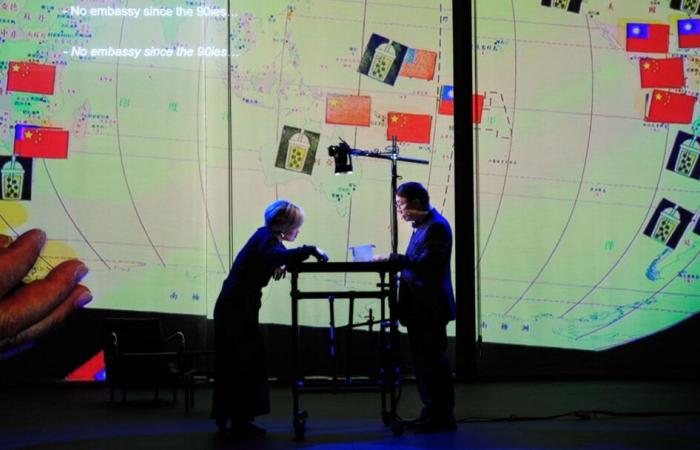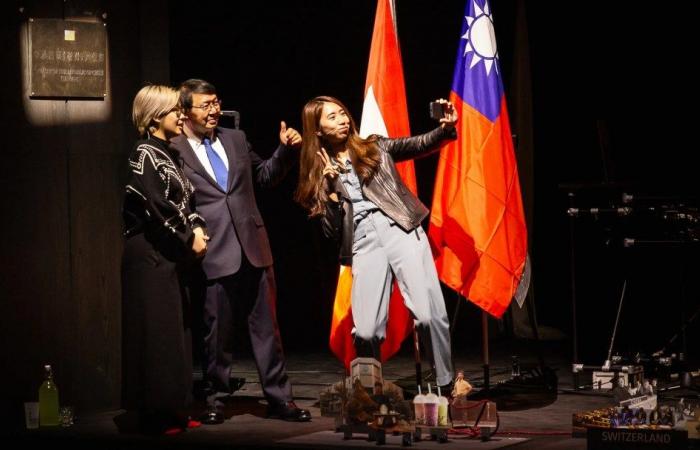For the duration of a show, three Taiwanese with unique trajectories open a fictitious embassy and wonder what this means for their unrecognized country. Stefan Kaegi stages this quest for identity and existence in an intelligent and inventive show, which finally seems to answer the question “what can theater do”?
In 2014, the Rimini Protokoll came to present a show in Taipei, the capital of Taiwan. The collective then noted with pleasure the liveliness of the island's artistic practices, in total contrast to China. As he was already able to do for Cuba (“Granma. Les trombones de La Havane”), Stefan Kaegi, member of the Rimini Protokoll collective, decides to dedicate a show to this island. He meets hundreds of people, activists, artists, diplomats, industrialists and journalists. His goal? Ask them about what it’s like to live in an unrecognized country but, also, delve into their private lives to better understand them.
On stage, we find three of them. Debby Wong, 27-year-old percussionist musician and heiress to a bubble tea empire. David Wu, a 72-year-old retired diplomat who served in Belize and New Zealand. Chiayo Kuo, a thirty-year-old activist convinced of the importance of the Internet for the future of her country. During the show, they do what is refused to Taiwan by almost all countries: they erect an embassy. The questions then multiply. Should we keep the historic flag? What about the official anthem with belligerent lyrics? What works of art to decorate the hall? Which name to choose: Taiwan or the official but little-spoken Republic of China? Beyond these questions which may seem superficial, the opening of this fictitious embassy leads them to wonder in a fascinating way about the history and future of the island.
A complex past, an uncertain future
Through these three performers, or rather “experts” as Stefan Kaegi prefers to call them, the public plunges into the complicated history of this island whose future remains more than uncertain.
Thanks to great scenographic inventiveness, the show manages to present the complex history of Taiwan. The arrival in 1949 of Chiang Kai-Shek and 2 million Chinese fleeing communism. The dictatorship then the democratization and growth of the 1980s. Above all, the inexorable rise in geopolitical and economic power of the immense Chinese neighbor. From now on, the country is only recognized by around ten micro-states (including the Vatican). France adopted the “One China” policy exactly 60 years ago by recognizing Mao's People's China.
The past and future of the island are perceived differently depending on the generation. The diplomat David Wu continues to worship Chiang Kai-Shek's Kuomintang. Like him, he dreams of a reunification of “two” China provided that the Taiwanese model can continue. For Chiayo Kuo, the former leader is above all a dictator and the future of Taiwan requires total independence, the only guarantee to maintain the democratic model. Debby Wong refuses to take sides for fear of harming the family bubble tea empire.
Between them, they sum up well the dissensions that exist within Taiwanese society. But their common presence on stage to discuss the future of their island also illustrates the specificity of Taiwan: its openness and its democracy. That these three citizens could travel freely, express their political opinions and, above all, their disagreements, would simply be unthinkable and impossible in Xi Jinping's People's Republic of China.
Journey into absurdity
The creation of this temporary embassy illustrates the absurdity in which the Taiwanese live on a daily basis. Although almost no country authorizes the opening of an embassy, all accept the existence of offices serving as official representation. During the COVID-19 crisis, Taiwan was the first country to alert the World Health Organization (WHO) but, as the island is not part of the UN, it was unable to join the WHO and was therefore never invited to any meeting.
And what about this anecdote told by David Wu during his military service? The island where he was stationed was only 2km from the Chinese coast. Taiwan sent missiles on Monday, Wednesday and Friday while China did so on Tuesday, Thursday and Saturday. The rest of the time, the Taiwanese used a giant loudspeaker to broadcast pop music banned by Mao and tried to convince the mainlanders to defect…
But this journey into absurdity also continues in France (or wherever the show travels). It is with great intelligence that the show underlines the hypocrisy of Paris and its authorities whose universalist commitment to human rights seems to stop once economic issues are on the table. After all, don't the majority of the public have clothes made in mainland China under disastrous conditions? Don't the French authorities often prefer to remain silent in order to guarantee access for multinationals such as LVMH or Total to the immense Chinese market?
What can theater do?
The three actors gathered on stage demonstrate immense courage in carrying the voice of a territory that China has always wanted to silence and that it regularly threatens with its military arsenal. We can only be impressed or even moved by this commitment. But if the show is so successful, it is because it also takes place in the intimate field. This alliance of the political and the personal is probably what Stefan Kaegi knows how to do best. By talking about his adoption discovered at the age of 50, David Wu raises another part of Taiwanese history. Speaking about her cancer diagnosis earlier this year and her desire not to boil down her life to activism, Chiayo Kuo's story goes beyond the borders of her island.
Artists are often asked what they can do in the face of the tragedies of the world. The response often disappoints. With his method of immersion and selection of “experts”, Stefan Kaegi may have found the solution. Listen to those who are closest to the subject and put the tools of theater at their service to emotionally enhance their testimonies. If you are looking for true cultural diplomacy, it is there.
« This is not an embassy (Made in Taiwan)” by Stefan Kaegi (Rimini Protokoll). Show in English and Chinese with French surtitles. Duration: 1h40. Presented from November 14 to 17, 2024 at MC93 in Bobigny as part of the Festival Autumn. On tour at the Phénix in Valenciennes on November 28 and 29 then at Lieu Unique in Nantes on December 4 and 5.







